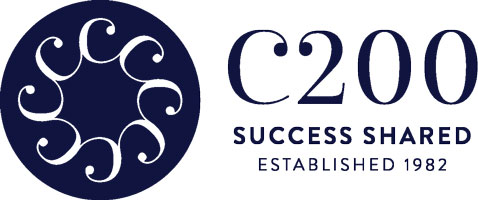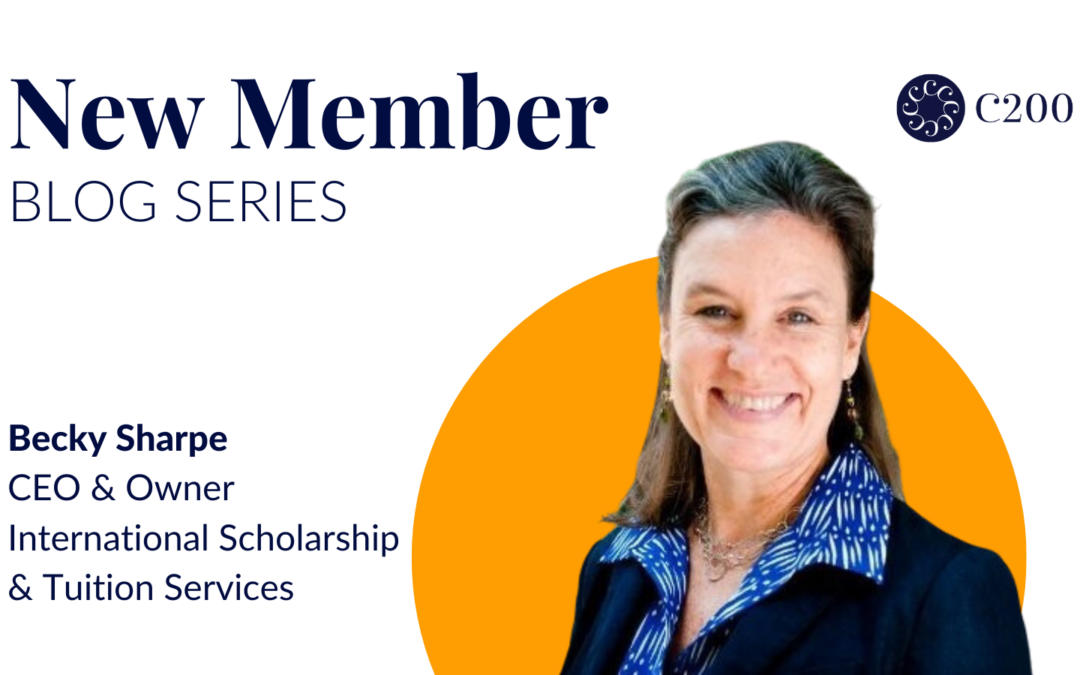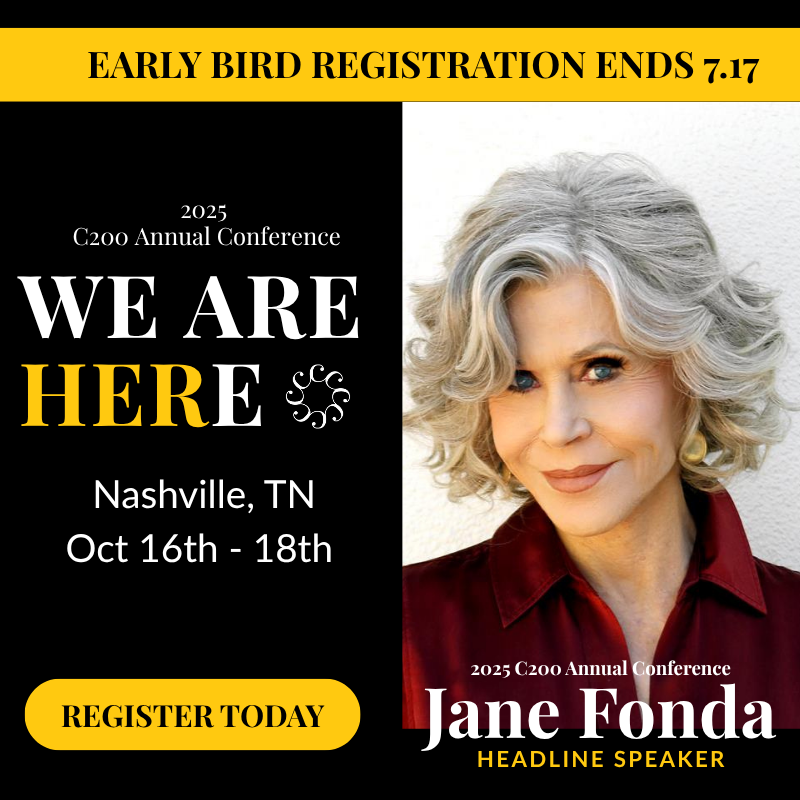Becky Sharpe is the CEO and Owner of International Scholarship and Tuition Services, a trusted educational assistance program management partner for organizations looking to enhance the impact of their scholarship, tuition assistance, tuition reimbursement, loan repayment or grant program. Becky cites selling Girl Scout cookies as a young girl as the moment she found her entrepreneurial and business-driven spirit. From a young age, Becky saw the importance and value of carrying oneself with maturity and professionalism to achieve success. Outside of work, Becky loves to cook with the fresh produce she grows in her garden and, because she enjoys being “a beginner at things,” is also learning how to play the piano. Becky has been a C200 member since July 2023.
Eva Glassman: Can you please introduce yourself and describe what you do?
Becky Sharpe: I own a business called International Scholarship and Tuition Services, and we manage large scholarship or tuition reimbursement programs. Organizations turn to us to manage their programs if it’s gotten too big for them to handle internally. I bought the company in 2002 and I’m 100% owner. We’re a virtual company, although many of us are in the Nashville, Tennessee area.
As owner and CEO of the company, my job is to protect and support our culture, to hold people accountable for implementing the vision of the company, and to hold my direct reports accountable for their day-to-day. We follow a “traction methodology,” which puts me in the “visionary” role and is a nice way of saying, “Keep me out of the details because I will mess everything up!” [laughs]
EG: Tell me more about how you wound up at International Scholarship and Tuition Services. Where did you start your career journey and what do you believe are the biggest factors of your success?
BS: Everything that I have accomplished has been because someone else has helped me. I’m very aware that I am part of a whole network of people, some of whom gave me my first jobs, gave me feedback in a job, made introductions, or mentored me to be more acquainted with the leader I wanted to be—even if that was not the one who was evolving at the moment they met me! [laughs]
My career started very early when I realized, as a young girl, that I could take a box of Girl Scout cookies and sell them to a stranger and make money. [laughs] I was hooked! From then on, I’ve always been a business development or sales person.
Although I would call selling Girl Scout cookies a serious endeavor because it was essentially a cold calling job, my first job as an adult was selling residential real estate in Nashville. I worked for an iconic woman, Shirley Zeitlin, who is still around. She allowed me to join her firm, and I was able to watch her lead from professionalism and not madness, despite all the sexism she experienced during her time.
I worked for Shirley for a few years before I went back and got my MBA at Vanderbilt. Then, I started working for a small startup. The word “startup” wasn’t a thing at the time, but looking back, that’s basically what it was. It was a startup payroll and human resources software company that ran on an IBM platform called the IBM AS/400, and that was basically a cold calling job. We built that company from the ground up—when I say we, I mean the owner of the company who had 100% ownership, a tech person who was writing the software, and me, who was doing sales and marketing. We took that company from no revenue to around $8 million.
I would probably still be at that company today had the ownership of the company fed and watered me a little bit more. They would never have engaged me in a group like C200—it just wasn’t their style.
I left the company in 2002, and then met a gentleman who introduced me to the guy that started the company that I own now. He offered to mentor me and help me along the path of learning how to run a business. I came on and negotiated a sweat equity deal with the owner, and then about five years later, I bought it out 100%.
EG: You’ve talked a little bit about an important female mentor in your career already, but I was wondering if you had any more women in your professional journey who helped you along.
BS: Although not a professional mentor, my first-grade teacher comes to mind. She might not have been a businesswoman, but she was in the business of educating children, and that can be very entrepreneurial. I was in first grade in the mid-70s, and my teacher was an African American female, Ms. Pepper. As a 6 or 7-year-old girl, I remember getting the message early on from Ms. Pepper that I could do anything that I wanted. And here she was, dealing with the prejudice of not only being a female teacher, but also an African American female teacher at mostly white school. She taught me the importance of professionalism, doing your best, and speaking from knowledge.
The first jobs I had as a preteen or teenager were in fast food, and I saw again that the successful women would ignore the meanness and stupidity, and just keep doing their best with a smile on their face—not because they weren’t going to do anything about it, but because it was mature and professional. A lot of times, you will encounter people who don’t want you to succeed, who will see if they can stir the pot or press your buttons. I saw those people, and I saw those women who wouldn’t stoop down to that level, and knew I wanted to emulate those women.
One of the worst interactions I had in my early career was at a software company, and I was sure that the highest-ranked leader in the company, who was female, was going to have my back. I was shocked when I found out that wasn’t the case. She was jealous and backstabbing, but I still learned from her; I just remember thinking, “I’m not going to be that person.” I learned that I wanted to come from a place of, “I don’t care who you are—I’m going to support you.” I don’t know what was going on in her life, but why would you treat a 20-something year old who just wants to learn that way? Why not be helpful and loving and supportive?
EG: Dealing with someone like that, it can be so easy to internalize that negativity and continue that cycle onto the next generation. It’s so easy to think, “I had a difficult time, so why should you have it easier than me?” I think it’s so interesting that you took the opposite route and understood her behavior as a learning opportunity for how you wanted to lead the next generation.
BS: I also think about doctors in this sort of situation. There were years where doctors thought the best professionals were poorly rested and badly nourished, because it showed how much time they put into their work. Personally, I don’t want that doctor operating on me who isn’t well-rested; embracing and choosing constant exhaustion shows stupidity, in my opinion.
EG: You can’t do your best work when you’re not taking care of yourself. My next question is: What does being a woman in business mean to you and how do you apply that thinking to your work and your life?
BS: To me, it presents a responsibility that I can choose to take seriously or not. My grandmothers would have loved the chance to own a business. It wasn’t even an opportunity for them. My maternal grandmother was one of the first women accepted to medical school in Tennessee, and as soon as she got married, they kicked her out. For my mother’s generation, there were so many stereotypes and so much sexism that made the experience very difficult. I feel a deep responsibility to take advantage of the incredible opportunity I have in front of me and not take it as a given. It’s a privilege, and I try to remind myself of that by imagining my relatives—whether it’s my mother, my great grandmother, my great-great-grandmother—and understanding that they were absolutely put in a box that I don’t have, and so my job is to take advantage of not being boxed in.
I also think it’s important not to be a know-it-all, to stay humble in my empowerment. I look at the younger generation and ask, “How can I learn from you?” I was never asked those questions by my elders; the younger generations have a lot to offer. I want to pay it forward, not by closing it down and doing the same thing, but by saying, “Teach me how to be a better 58-year-old business owner. What can I do better?”
EG: When I ask other women this question, they always make mention of their sense of responsibility—not only as a successful businessperson, but also as someone with the chance to build on progress, to make it easier for the younger generation to achieve even more that you could have dreamed of. It’s wonderful that so many of our members at C200 share that same philosophy. Shifting gears, what do you enjoy doing outside of work?
BS: I love to garden and cook with my husband. Right now, it’s fall, so I have arugula, onions, spinach, turnip greens, and mustard greens in my garden. In the summer in Nashville, we’re lucky that we can plant pretty much anything from late April onward.
I’m an avid athlete—not good, just avid. I like to hike, bike, swim, and walk. I love to read and write—I’m writing my second book right now. I’m also currently learning to play the piano—I’m like a four-year-old on the piano right now, but I like to be a beginner at things.
EG: What is your advice for aspiring female entrepreneurs and business leaders to advance their own careers?
BS: This isn’t my idea, but I love it anyway. Make sure that the “trifecta” is there, which is: 1) that you’re really passionate about your job, 2) that people want to buy your product, and 3) that the price they’ll pay for it allows you to live the lifestyle you want to live. You don’t have to have those three things, but if you don’t have them, you won’t have optimal mental and physical health, which is so important for your success. If your mind is not right, your body’s going to follow, and vice versa.
Everyone’s mental health improves with different things, so it’s important to know what nourishes you, whether that’s spending time in nature, with people you enjoy, or something else. Be careful of people who try to tell you why things aren’t going to work; surround yourself with people who are going to tell you how it will work and support you, even if it’s a wild and crazy idea.
Even though you’re trying to climb the ladder, it’s important to give back in your life as you do. It’s very easy to think, “Oh my gosh, I’m running so fast, and I don’t have enough money or time.” We can give back without any time or money exchange by simply liking something on social media, starting a conversation online, or engaging with a post in some other way. It spreads the word about important things and creates community and connection.
Maybe this isn’t strictly professional advice, but something else I’ll say about social media is: Don’t hang out with the haters. Hang out with people who enjoy things and share funny pug pictures and love, not people who get energy out of hurting people. I don’t think that does well for any of us. Brené Brown says, “There are a million cheap seats in the world today filled with people who will never be brave with their own lives but will spend every ounce of energy they have hurling advice and judgement at those of us trying to dare greatly.” Social media has so much power to it, but being able to curate your online experience and unplug at times is so important.
EG: What are you most excited about as a new C200 member?
BS: I attended the 2023 Annual Conference in San Diego, so my expectations are high now that I’ve met Brooke Shields! Who’s next? [laughs] But in truth, I’m most excited about getting to know members. The one-on-one conversations I had with members at the conference were great, and I’m now in contact with a bunch of women. Finding out how I can be a resource and learning from them is really what I’m most excited about. I travel a fair amount teaching workshops around the country, so I’m going to reach out to C200 members anytime I’m in town and get to know some people personally.


